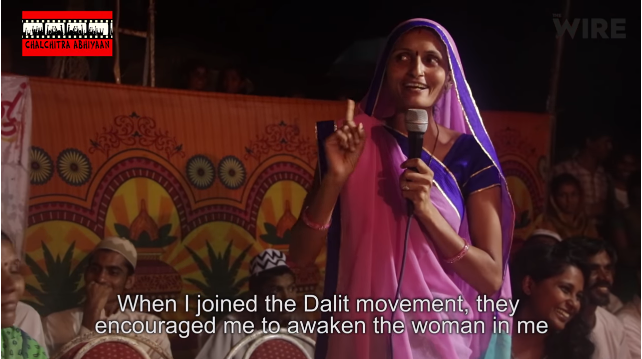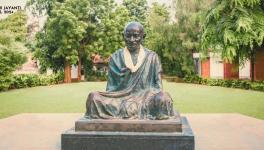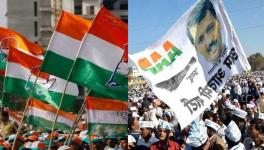They Sang through the Dark Times: Nakul Singh Sawhney’s Latest Documentary Savitri’s Sisters

With Savitri’s Sisters, filmmaker Nakul Singh Sawhney takes the camera back to women. His camera follows two women from the Rashtriya Dalit Adhikaar Manch – Laxmiben and Madhuben. He shoots the film during the Azaadi Kooch yatra, a journey that began to mark the one-year anniversary of the Una protests.
In its intent, the film is reminiscent of Sawhney’s second documentary on the Khap Panchayats in Haryana, Izzatnagari ki Asabhya Betiyan, probably his best film so far. Sawhney’s ability to make the camera a trustworthy object for his subjects is commendable. Like the women of Izzatnagari, his subjects react to the camera as an object that is deserving of their trust. The most endearing moments of Savitri’s Sisters are those in which Laxmiben reacts to the camera directly. When she is traveling in a bus, singing along the way, she suddenly stops, looks at the camera, and asks, “Why are you recording my singing? I’m not a singer”. The question makes us think, what are those moments in political movements which are considered important – is it the singing, the speeches, or arrests?
Apart from following and recording the two women, the short documentary asks this question as a kind of sub-plot. The shots of the protests, for instance, do not have any of Jignesh Mevani’s speeches, or his arrest and detention – events which received the media’s attention. Instead, a montage of motorcycles, Ambedkar’s portraits, is accompanied by Mevani’s voice, “Please settle down or we won’t be able to start our protest in time”. Laxmiben, too, is shown to make a speech, but the speech is barely shown. Instead, we see her leaving the protest site and boarding a bus, clicking a selfie in between. Several shots also focus on men and women dancing during the Azaadi Kooch. Sawhney seriously asks how a protest can be recorded and represented, but does not have the time to explore it enough, given the short length of the film.
We see Madhuben’s initial speeches, where she is not confident to speak on stage, but, later, comes across as a very articulate speaker in front of the camera. In her interviews through the film, she keeps using a word, jagruti – consciousness. In the latter half of the film, Sawhney asks her if their movement will stop if dalits get the land that has been promised to them. The Una movement began as a movement that aimed to distribute land forcibly occupied by upper castes among dalits. Madhuben smiles a wry smile and responds, “No, the movement won’t stop if we get the land… The consciousness is yet to come in several sections among dalits”. Laxmiben, sitting next to her, quips: “Yeh toh bas aangrayi hai, aage aur ladai hai” (This was but a little stretching, many more battles remain ahead).
Laxmiben and Madhuben also single themselves out. They are different from other dalit women. They are quick to point out that other women have not left behind their restricted ways of life. The consciousness is yet to spread. At several moments, Laxmiben gently admonishes a boy who says that the rules of his village do not permit women to move out of their homes. At another moment, she refuses to be garlanded by women who are veiled, and asks the gathering, “Will you have a problem if they remove their veils?” These are complexities that are only shown, but not quite unraveled in the film.
The film is a testament to the fact that social movements may start on one premise, but that one premise gives rise to many more questions and aspirations which crop like branches of a tree. The question of land is only the trunk that is at the centre of the Rashtriya Dalit Adhikaar Manch. There are, however, branches and leaves that crop out beyond the initial premise. The film is more like a news feature (but a very different and refreshing news feature) but does not have the depth of Sawhney’s earlier films. It would be nice if Sawhney continues with this project even though the Azaadi Kooch journey is now over.
Disclaimer: The views expressed here are the author's personal views, and do not necessarily represent the views of Newsclick.
Get the latest reports & analysis with people's perspective on Protests, movements & deep analytical videos, discussions of the current affairs in your Telegram app. Subscribe to NewsClick's Telegram channel & get Real-Time updates on stories, as they get published on our website.
























